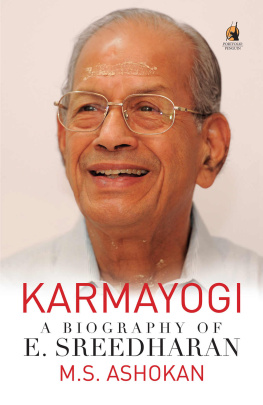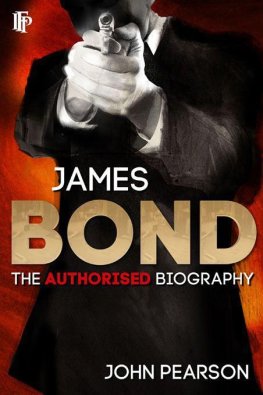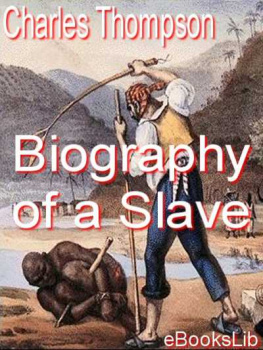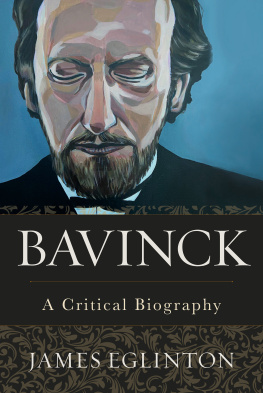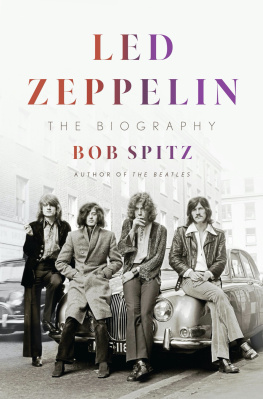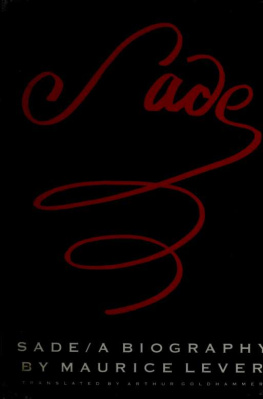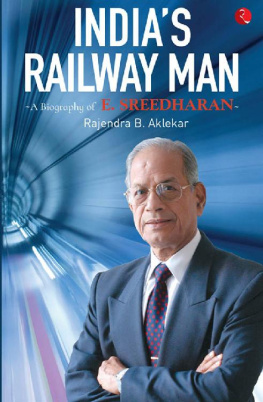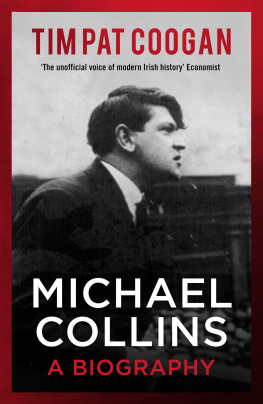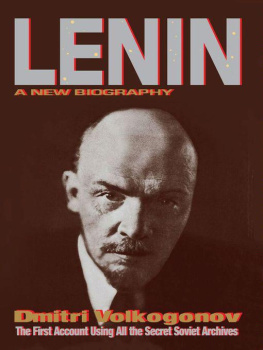M.S. Ashokan - Karmayogi: A Biography of E. Sreedharan
Here you can read online M.S. Ashokan - Karmayogi: A Biography of E. Sreedharan full text of the book (entire story) in english for free. Download pdf and epub, get meaning, cover and reviews about this ebook. year: 0, genre: Science. Description of the work, (preface) as well as reviews are available. Best literature library LitArk.com created for fans of good reading and offers a wide selection of genres:
Romance novel
Science fiction
Adventure
Detective
Science
History
Home and family
Prose
Art
Politics
Computer
Non-fiction
Religion
Business
Children
Humor
Choose a favorite category and find really read worthwhile books. Enjoy immersion in the world of imagination, feel the emotions of the characters or learn something new for yourself, make an fascinating discovery.
- Book:Karmayogi: A Biography of E. Sreedharan
- Author:
- Genre:
- Year:0
- Rating:4 / 5
- Favourites:Add to favourites
- Your mark:
- 80
- 1
- 2
- 3
- 4
- 5
Karmayogi: A Biography of E. Sreedharan: summary, description and annotation
We offer to read an annotation, description, summary or preface (depends on what the author of the book "Karmayogi: A Biography of E. Sreedharan" wrote himself). If you haven't found the necessary information about the book — write in the comments, we will try to find it.
Karmayogi: A Biography of E. Sreedharan — read online for free the complete book (whole text) full work
Below is the text of the book, divided by pages. System saving the place of the last page read, allows you to conveniently read the book "Karmayogi: A Biography of E. Sreedharan" online for free, without having to search again every time where you left off. Put a bookmark, and you can go to the page where you finished reading at any time.
Font size:
Interval:
Bookmark:



PENGUIN BOOKS

PENGUIN BOOKS
PORTFOLIO
M.S. Ashokan is an author and senior journalist with over twenty years of experience. He currently works with the Deshabimani daily. Painting (in oil and water colours) is a passion that he pursues seriously. He lives in Kochi with his wife and two children.
Rajesh Rajamohan has been working in the IT industry for almost two decades. He has translated Litanies of Dutch Battery, a major work of fiction by N.S. Madhavan, which won the Vodafone-Crossword Prize for Best Translated Fiction in 2011, was shortlisted for The Hindu Literary Prize and was longlisted for the Man Asian Literary Prize the same year. His latest work of translation is The Gospel of Yudas by K.R. Meera. He lives in Pennsylvania, USA, with his family.
Sreedharan has become a synonym for the magnificence of human endeavour that makes the impossible possible. There has not been any parallel, in the last six decades, to his contribution as a technocrat who modernized and expanded the countrys transportation systems to match global standards. What stands out about this genius, who hails from Karukaputhur, an obscure, remote village in the district of Palakkad in Kerala, is not just the sheer volume and reach of the development projects he undertook, but also how in mission after mission, he reaffirmed the time-tested values from ancient wisdom that he has always cherished, functioning with purpose and transparency even while keeping corruption at bay, with an effort akin to prayer.
The nation took note of Sreedharan, the trailblazer, when he led the epic mission of building the Konkan Railway on a tight schedule to link the northern end of Keralathe southernmost state of Indiato the financial city of Mumbai. Known as one of the greatest engineering feats of modern times, the Konkan line ran along the west coast of India, negotiating the difficult terrain that lay between the Western Ghats and the Arabian Sea. That a railway line boosts a regions industrial and economic prospects had long been realized, and plans for such a line had been in the making since the time of the British Raj. However, all attempts to implement them came to naught, what with the Konkans forbidding terrain making it a terribly impractical prospectthat is, until Sreedharan took charge.
Sreedharan had long retired from the Indian Railways when parleys for the countrys first modern metro in Delhi began and his name was suggested for heading the project. There were legal barriers to appointing a retiree in the top position at a public enterprise. However, no argument or obstruction could thwart Sreedharans progress along his path of action for very long. The Sreedharan Effect extended beyond the Delhi Metro; following its success twenty more big cities in India embarked on plans for metros of their own.
The new transportation system that would come with an incredibly steep price tag, one which the country could hardly afford, drew prolonged and intense criticism. But in the end, the success of the metro in Delhi, which flaunted the most advanced technology from around the world, made for a fitting reply to all the naysayers. The benefits the metro broughtsuch as significant reduction in pollution, decline in road accidents, improved infrastructure that accelerated development activities, and change in the quality of life of the general publicblunted much of the criticism. What was more, efforts had begun to expand public transportation projects by inviting private participation. But Sreedharan openly rejected this idea. He contended that ownership and operation by the government was the only reason for the success of projects of the metro kind, proving beneficial to the people while remaining growth-oriented.
Sreedharan does not possess the halo of the IIT graduate or a Civil Services luminary considered among the holy cows of India. Armed with only a regular degree in civil engineering, Sreedharans success lay in his unflinching commitment to his core values in both his personal and professional lives. This commitment took him on an incredible ascent to the pinnacle of achievement in his field. His philosophy of committed and ethical work would stand taller than the gargantuan projects delivered under his groundbreaking engineering and management brilliance. The Bhagavad Gita had always been his inspiration. Havingas he describes itimbibed the supreme power of motivation from the book that cracks open the path of action for the seeker, Sreedharan would always share the Gitas message with his colleagues.
This book is an attempt to get up and close to the man and his life that have inspired many, including the younger generations. He has magnanimously given his precious time to the author despite his singularly hectic professional life, graciously ironed out factual kinks, adding relevant clarity from start to finish. Here is hoping this modest tribute will help readers get a closer glimpse of the genius the nation has come to love, admire and even revere in their hearts and minds.

8 January 2013, Kochi
Before the day broke, a clutch of OB vans from assorted television news made a beeline at the hotel Le Meridien. The heated debates livening up the Malayalee NRI conference at the convention centre revolved around one questionwould Delhi Metro Rail Corporation (DMRC) and E. Sreedharan be leading the much-awaited Kochi Metro project? Union Minister for Urban Development Kamal Nath, Chief Minister of Kerala Oommen Chandy and four other central ministers from Kerala were cooped up in the hotel, tasked with making the all-important and final decision on DMRCs role in the project. Updates from correspondents flew from the Le Meridien to the news channels minute by minute. The breaking news scroll on the channels ran a different story every couple of minutes.
Into this charged atmospherethick with the fog of disputes that had raged for months and that were now headed to their climaxthe principal advisor for DMRC, E. Sreedharan, was making his way in. His car rolled into the convention centre and he stepped out of it, his face bearing his usual solemn expression, divulging little of what was on his mind. Those who were looking to interpret something from his body language were disappointed. The meeting continued behind closed doors, while outside, newsmen indulged themselves in a fresh wave of speculation.
It was all over in just half an hour! Everyone came out of the centre at the same time. Sreedharans face still revealed nothing. The central minister announced to an army of newspersons that they had decided to go with DMRC and Sreedharan for the metro project. Sreedharan forced a smile as this much-anticipated news was announced. Yet, there was no triumph in his voice when he talked to journalists afterwards, although the decision had been a hard-fought victory that took over a year. His demeanour appeared to proclaim that everything had happened just as it should have, whereas those who announced the decision were bending over backwards to make it look to the media that there really was no choice other than DMRC and Sreedharan.
Font size:
Interval:
Bookmark:
Similar books «Karmayogi: A Biography of E. Sreedharan»
Look at similar books to Karmayogi: A Biography of E. Sreedharan. We have selected literature similar in name and meaning in the hope of providing readers with more options to find new, interesting, not yet read works.
Discussion, reviews of the book Karmayogi: A Biography of E. Sreedharan and just readers' own opinions. Leave your comments, write what you think about the work, its meaning or the main characters. Specify what exactly you liked and what you didn't like, and why you think so.

